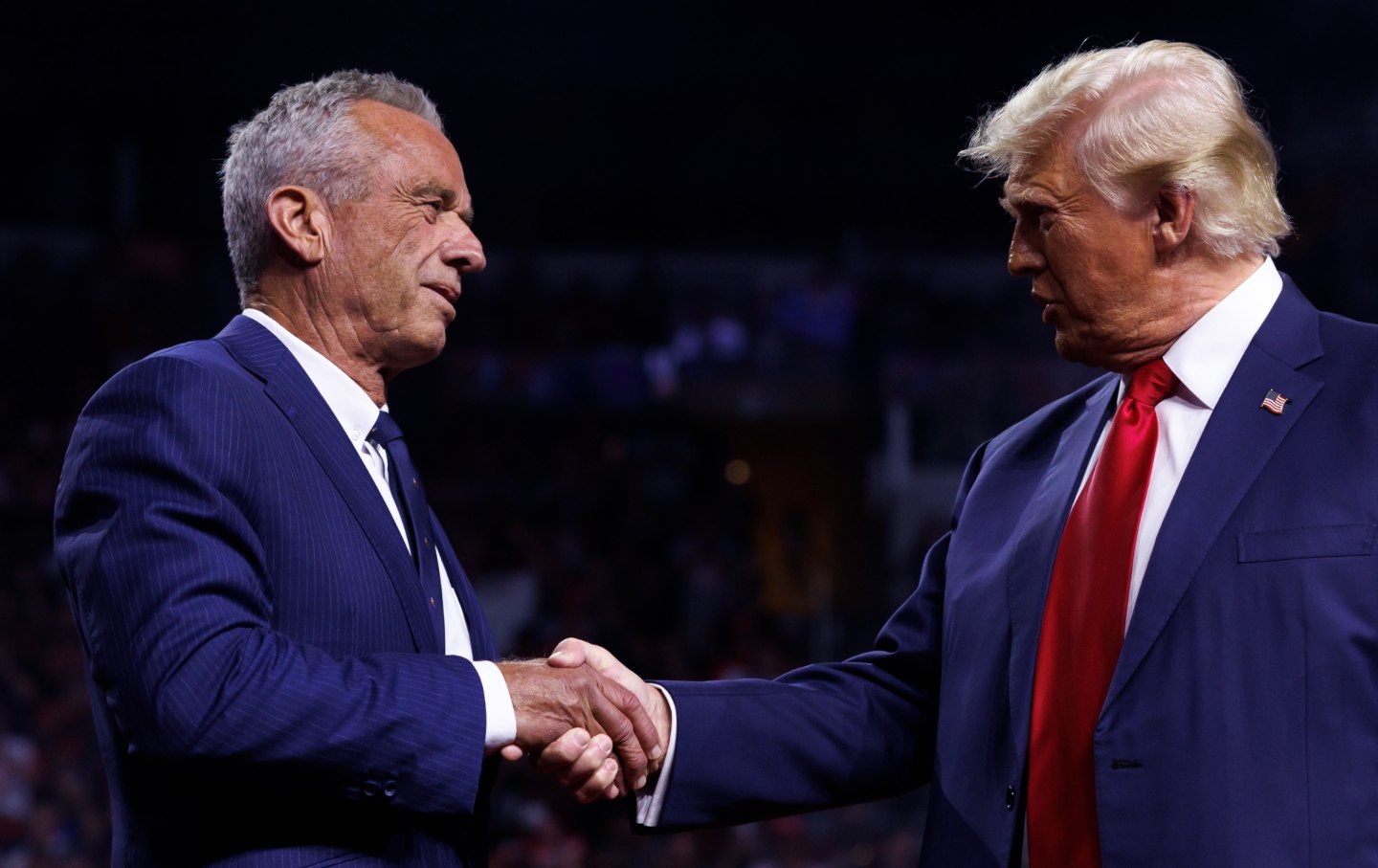The administration has forced crucial scientific activity to grind to a halt. It’s an act of national suicide.

Donald Trump is greeted by Robert F. Kennedy Jr. on stage during a campaign event at Desert Diamond Arena in Glendale, Arizona, on August 23, 2024.(Tom Brenner / The Washington Post via Getty Images)
Even before President Trump was inaugurated a second time, it was clear that his approach to health policy would be spectacularly destructive. His nominees for key public health posts were either unqualified or so deeply mired in conspiracy theories about issues from vaccines to Covid that it was hard to see how these choices had any redeemable virtues.
Some of our more credulous health writers, like Emily Oster and Rachael Bedard in The New York Times, or Leana Wen in The Washington Post, waxed encouragingly on the not-so-bad qualities of RFK Jr and invented a fantasy world where we could all join hands and work together on certain issues. It won’t surprise you to learn that I disagree. Instead, I’m thinking of a poem by Anne Sexton:
But suicides have a special language.Like carpenters they want to know which tools.They never ask why build.
Once you see that the Trump administration is marching us to collective self-immolation, you can stop asking about motives and focus on what tools will be brought to bear on this singular vision to destroy ourselves.
Which brings me to the first few days of the Trump administration. If you wanted to destroy public health in America, the Trumpistas are off to a good start—even without deranged lunatics like RFK Jr. officially in post.
First, key communications from federal health agencies are now under a blackout. Information is the lifeblood of the work we do in public health. Now, we see the Morbidity and Mortality Weekly Report (MMWR)—where the first news of potential health threats gets posted—taken offline. A closed-door briefing by CDC for state health officials on H5N1 was also canceled.
Trump hit the pause button on communications in his first term too, but this version is far more expansive, with more agencies caught in the net. Perhaps the communications ban will be lifted shortly, but we also know that President Trump’s minions sought to change MMWR reports and other CDC communications on Covid in 2020 to suit his political needs. Just wait for RFK Jr.’s big red pen.
On Wednesday, panicky posts on social media started to emerge from researchers across the country. Study sections—the peer review panels that choose which grants to recommend for funding at the National Institutes of Health— had been canceled without warning, putting the flow of research dollars in limbo.
Most Americans probably don’t know this, but so much of what we take for granted when we seek care in the US—the medicines, the diagnostics, the procedures—have come out of NIH research. The development of new cures and new vaccines relies on this agency, like no other. Even a short pause like this puts scientists in danger of running out of money, given the huge role that the NIH plays in funding biomedical research. I raise 75 percent of my salary every year from NIH grants and I am at one of the richest institutions in the world.
Gaps in funding can interrupt important studies, and some may not recover. People could even lose their jobs—universities don’t automatically fill in for the NIH when the going gets tough. Meanwhile, researchers at NIH have been banned from making scientific presentations, even ones scheduled long in advance. Trainings and conferences sponsored by NIH have also been canceled.
These moves are desperately capricious and foolish, but the stakes couldn’t be higher. The picture of a child at the controls of a nuclear reactor comes to mind, poking randomly at buttons with his short, stubby fingers. The health and well-being of Americans hang in the balance and can all go up in smoke.
These are the first steps to destroying American public health, biomedicine, and science as we know it. Russ Vought, the architect of Project 2025, the guiding document of the new administration, is sitting atop the Office of Management and Budget, tossing out these edicts like horseshoes aimed straight at the head of the most important parts of the federal government. “Like carpenters they want to know which tools. They never ask why build.”
It’s day five of this administration, and we’ve got to be in this for the long haul. Running around in panic is what they want. What we need is to get organized. Some have suggested that resignation, not resistance, is the hallmark of our new era, that we’ve entered Vichy America, where we roll a cigarette, sip an espresso at the bar, and moan about our plight, but mostly capitulate and watch Trump’s troops march in with a sang-froid that would give Henri‑Philippe Pétain a run for his money.
Sorry, but I won’t be complicit in an act of national suicide, and neither should you. Scientists and clinicians, despite the critiques thrown around during Covid for being “too political,” are generally focused on their research and care of their patients. But it’s time to step up folks. Pick your battle. For me, it’s about public health, biomedicine, and healthcare in America, and I’ll fight as long as I can.
Gregg GonsalvesTwitterNation public health correspondent Gregg Gonsalves is the codirector of the Global Health Justice Partnership and an associate professor of epidemiology at the Yale School of Public Health.